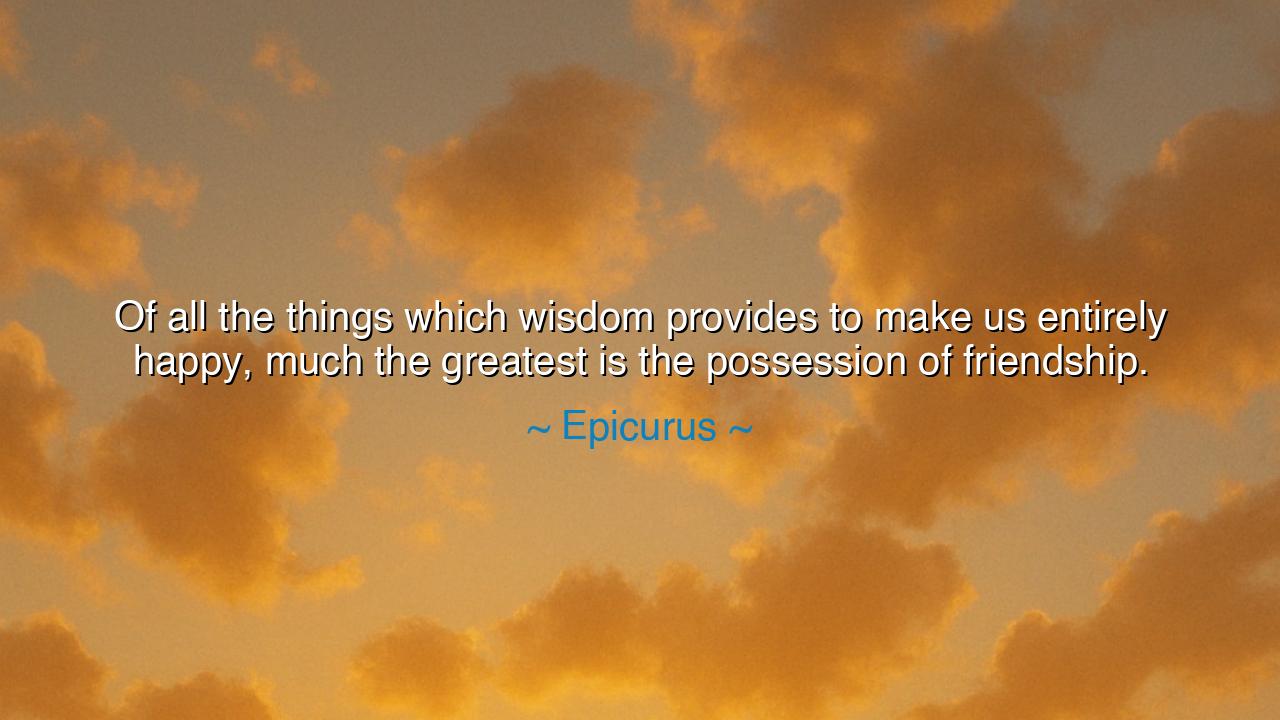
Of all the things which wisdom provides to make us entirely
Of all the things which wisdom provides to make us entirely happy, much the greatest is the possession of friendship.






“Of all the things which wisdom provides to make us entirely happy, much the greatest is the possession of friendship.” Thus spoke Epicurus, the sage of serenity, whose teachings have endured for centuries as a guide to the art of living well. In this single phrase, he captures a truth that transcends time and culture: that no wealth, no pleasure, no power can rival the quiet joy and strength found in friendship. For Epicurus, who sought peace not in grandeur but in simplicity, the companionship of kindred souls was the highest treasure that wisdom could offer—a balm for sorrow, a mirror for virtue, and a fortress against the storms of life.
The origin of these words lies in the Garden of Epicurus, a small community he founded outside Athens around the 4th century BCE. There, under olive trees and open skies, men and women gathered not to debate politics or pursue fame, but to learn the philosophy of happiness. They shared food, laughter, and thought; they lived modestly but richly, bound not by ambition but by friendship. Epicurus taught that true joy arises not from luxury but from freedom—from fear, from excess, from loneliness. And he saw in friendship the most natural expression of this freedom, for in the company of trusted companions, the soul finds rest.
Unlike many philosophers of his time, Epicurus did not see friendship as an ornament to life, but as its foundation. To him, friends were not mere allies in convenience but extensions of one’s own being—souls united by mutual goodwill and understanding. “We must not think,” he said, “that friendship is born out of utility, but rather that utility is born from friendship.” It is not that we love our friends because they help us; rather, they help us because we love them. In this lies a profound and timeless insight: that true friendship is not transactional, but transformational—it refines the heart and elevates the spirit.
History itself provides many shining examples of such friendship, but none more radiant than that of Damon and Pythias, whose story the ancients told as a hymn to loyalty. When Pythias was condemned to die, he asked to settle his affairs, and Damon offered himself as hostage until his friend returned. The tyrant, skeptical of their bond, was astonished when Pythias came back, though he could have fled to freedom. Moved by such devotion, the ruler spared them both, saying he wished to be counted as their third friend. This tale, though ancient, breathes the same spirit as Epicurus’ teaching: that friendship, founded on trust and love, is the highest form of human virtue—the truest mirror of the divine.
Epicurus also saw friendship as the cure for one of humanity’s deepest afflictions: fear. To walk alone in the world is to be vulnerable to its chaos. But to walk beside a friend is to feel the strength of two hearts beating in unison. Friendship teaches courage, for it reminds us that we are not alone in our striving or in our suffering. Even death, that great terror of mankind, loses its sting when we know that our love will outlast our bodies. “A friend,” said Epicurus, “is another self.” And in this union of souls, mortality itself finds meaning.
Yet, Epicurus’ wisdom carries not only beauty but discipline. To possess friendship requires patience, gentleness, and humility. The wise man does not demand perfection of his friends, nor does he abandon them in weakness. Friendship, like the tending of a garden, requires constant care—a willingness to forgive, to listen, to nurture. It is not forged through words alone, but through consistent deeds of loyalty and kindness. Epicurus taught that even the wise man, who needs little else in life, still needs friends—not out of weakness, but because affection is part of the natural order of the soul.
Let us then take this ancient teaching to heart. In a world that often values achievement over affection, let us remember that happiness is not found in what we possess, but in whom we walk beside. Let us choose our friends with care, not by status or advantage, but by the purity of their hearts. Let us be generous with our time, quick to forgive, and steadfast in our devotion. For in friendship, we find not only joy but wisdom—the wisdom that life is meant to be shared.
And so, as Epicurus reminds us, the greatest gift that wisdom offers is not solitude in enlightenment, but companionship in goodness. For though gold may glitter and pleasure may fade, the light of friendship endures—steady as the flame of the hearth that warms the weary traveler. Cherish it, nurture it, and guard it well, for to possess even one true friend is to possess a piece of heaven on earth.






AAdministratorAdministrator
Welcome, honored guests. Please leave a comment, we will respond soon